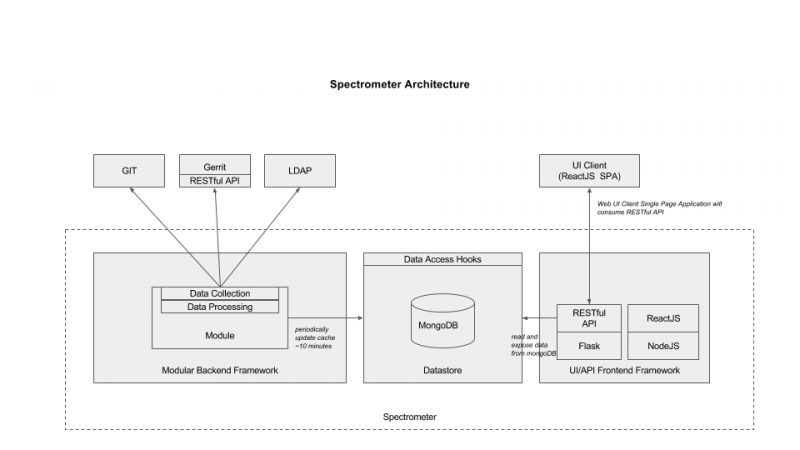Welcome to Spectrometer
Introduction
The main purpose of Spectrometer is to deliver transparent statistics of contributions to OpenDaylight Project. It collects activity data such
- Commits and number of code lines changed from ODL Git repositories
- Reviews from Gerrit
- Activities related to each project from mailing lists and presents the statistics in a user-friendly manner

Spectrometer Architecture
The spectrometer architecture has three components: the backend processor called workers, the datastore with in memory cache available, and the frontend visualization components for the UI/UX.
The architecture is described in more details in the Spectrometer Architecture Guide.
Git commits history
In first version of Spectrometer, Git history is acquired using following command:
git log --pretty="commit_id:'%H%ndate:%at%nauthor:%an%nauthor_email:%ae%nsubject:%s%nmessage:%b%n'" --shortstat -M --no-merges
which produces output like:
commit_id:b5a416ac344160512f95751ae16e6612aefd4a57
date:1369119386
author:Akihiro MOTOKI
author_email:motoki@da.jp.nec.com
subject:Remove class-based import in the code repo
message:Fixes bug 1167901 This commit also removes backslashes for line break. Change-Id: Id26fdfd2af4862652d7270aec132d40662efeb96
diff_stat: 21 files changed, 340 insertions(+), 408 deletions(-)
This commit changes 21 files and 340 + 408 = 748 LOC (Line Of Code). I.e. LOC is a sum of insertions and deletions.
The same status can be acquired using Gerrit REST API. https://git.opendaylight.org/gerrit/Documentation/rest-api-changes.html#list-changes
Gerrit History
Gerrit provides a command line interface for retrieval of review source data.
gerrit query --all-approvals --patch-sets --format JSON module branch:master limit:100
This command outputs a list of the latest reviews on the module.
Spectrometer provides the following analytics for reviews:
- Number of reviews
- Statistics of positive and negative reviews
- Ratio of positive to negative reviews.
Mailing list activity
- Mailing list activity is polled via the web-based OpenDaylight archives.
- Spectrometer searches the following places to choose the module to which an email is related, in order:
- Module name in brackets in email subject
- Module name without brackets in email subject
If none of the above locations yields a known module, the email is attributed to the 'unknown' module.
The list of tracked web pages with mail archives is managed in default_data.json under the section marked 'mail_lists'.
Corrections
LOC is an unreliable metric as it can be easily skewed by large scale renaming and refactoring. Spectrometer provides a framework for a community-driven correction process. It works as follows: Corrections are stored in the corrections.json JSON file.
These corrections look something like this:
"corrections": [
{
"commit_id": "ee3fe4e836ca1c81e50a8324a9b5f982de4fa97f",
"correction_comment": "Reset LOC to 0",
"lines_added": 0,
"lines_deleted": 0
}
]Updates to original Spectrometer
- Start with a new code base
- Spectrometer will support only one version of Python, this will result in simplification of the code and ease of maintenance
- A code base that is viewable/accessible easily to the people working on the project.
- Spectrometer will be developed on ODL infrastructure so it can have a real time update of working version, consequently real time access to updated results and Testing using ODL CI infrastructure with real data

